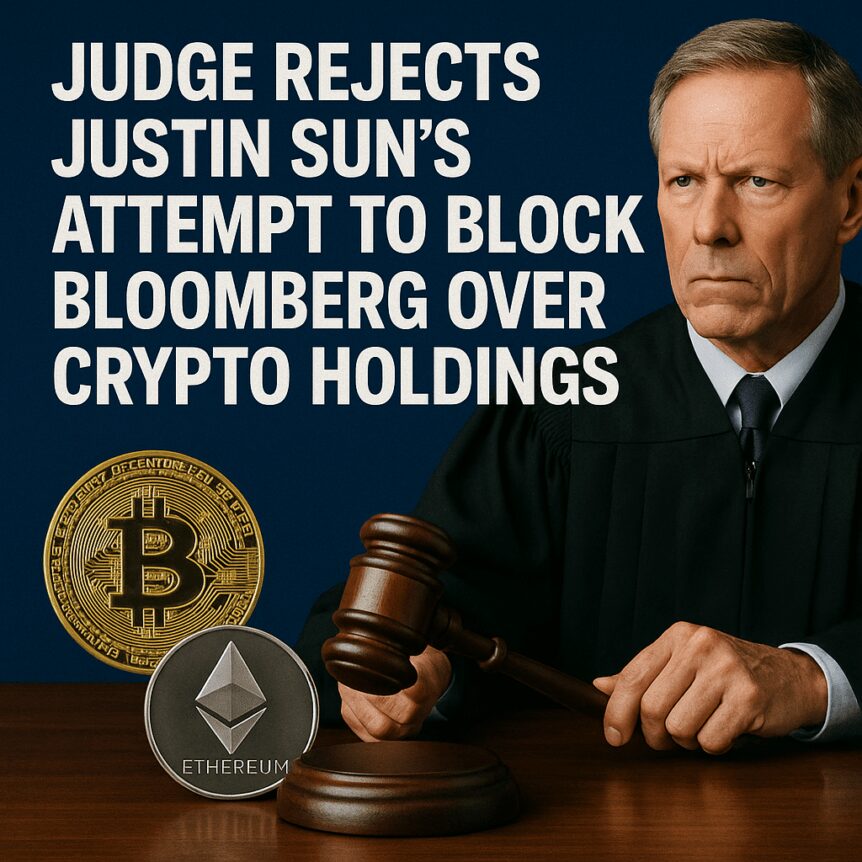Judge Rejects Justin Sun’s Attempt to Block Bloomberg Over Crypto Holdings

In a pivotal legal development, a U.S. judge has declined to grant an immediate restraining order against Bloomberg, allowing the financial news giant to publish details of Tron founder Justin Sun’s cryptocurrency holdings. This decision emerges amidst ongoing disputes over the confidentiality of Sun’s wealth disclosures, raising questions about privacy, transparency, and regulatory scrutiny within the volatile landscape of cryptocurrency markets.
- A U.S. court rejected Justin Sun’s request for a temporary restraining order against Bloomberg over publishing his crypto holdings.
- The dispute centers on Sun’s alleged holdings of billions in Tron (TRX), Bitcoin (BTC), Ethereum (ETH), and Tether (USDT).
- Sun argues that the disclosure could compromise his privacy and security, but the court found insufficient grounds for an injunction.
- Legal tensions highlight the ongoing battle over privacy rights and transparency in the crypto industry.
- Sun remains under regulatory scrutiny, with previous lawsuits and congressional inquiries surrounding his crypto ventures.
A U.S. district court has dismissed Justin Sun’s motion for a temporary restraining order (TRO) against Bloomberg, permitting the publication of details related to his cryptocurrency holdings. The case, filed in the District of Delaware, revolves around Sun’s objection to Bloomberg’s planned coverage of his private wealth, which reportedly includes approximately 60 billion Tron (TRX), 17,000 Bitcoin (BTC), 224,000 Ether (ETH), and 700 million Tether (USDT).
The controversy began after Bloomberg requested information from Sun’s team in February to update its Billionaires Index, prompting Sun to claim that the publication’s intended disclosures were “unverified, confidential and private.” Sun’s legal complaint, filed in August, sought to bar Bloomberg from revealing any specifics of his crypto assets, citing concerns over privacy and potential security risks.
Despite Sun’s assertions that the publication of his holdings could increase his vulnerability to hacking or physical threats, the court found that he had not proven Bloomberg’s promises of confidentiality or that public disclosure would significantly heighten his security risks. Notably, the judge highlighted that Sun himself has publicly disclosed detailed information about his Bitcoin investments, which undermines his privacy claims in this instance.
In its ruling, Judge Colm Connolly emphasized that Sun failed to demonstrate that Bloomberg’s dissemination of his crypto holdings would lead to an increased threat of cyberattacks or physical harm. He also pointed out that Sun’s own disclosures in social media posts disclose more detailed information than what Bloomberg seeks to publish. Accordingly, the court dismissed the request for a temporary injunction, allowing Bloomberg to proceed with its coverage.
It remains uncertain whether Sun will pursue further legal options following this ruling. Contacted for comment, a spokesperson for Sun declined to respond by publication time. Meanwhile, the broader regulatory landscape continues to scrutinize Sun, with ongoing investigations and congressional inquiries related to his cryptocurrency ventures and potential influence from political interests.
Sun is still under scrutiny from US lawmakers
The Tron founder’s legal challenges are part of a larger compliance and regulatory saga. He was recently involved in a lawsuit filed by the U.S. Securities and Exchange Commission (SEC) over allegations that his crypto offerings constituted unregistered securities. However, that case was temporarily stayed after a change in leadership at the SEC. Congressional representatives have also questioned whether Sun’s investments, some linked to political figures, may have influenced regulatory decisions, raising concerns about fairness and transparency in crypto regulation.
As the debate over cryptocurrency regulation intensifies, Sun’s case highlights the ongoing struggle between privacy rights for crypto entrepreneurs and the push for transparency within the blockchain industry. Legal rulings like this not only impact individual cases but also set precedents for the broader crypto ecosystem’s approach to disclosure and privacy concerns in compliance with evolving regulatory standards.
This article was originally published as Judge Rejects Justin Sun’s Attempt to Block Bloomberg Over Crypto Holdings on Crypto Breaking News – your trusted source for crypto news, Bitcoin news, and blockchain updates.
You May Also Like

Satoshi-Era Mt. Gox’s 1,000 Bitcoin Wallet Suddenly Reactivated

Cardano (ADA) Releases New Roadmap – Here’s What They Have Planned
